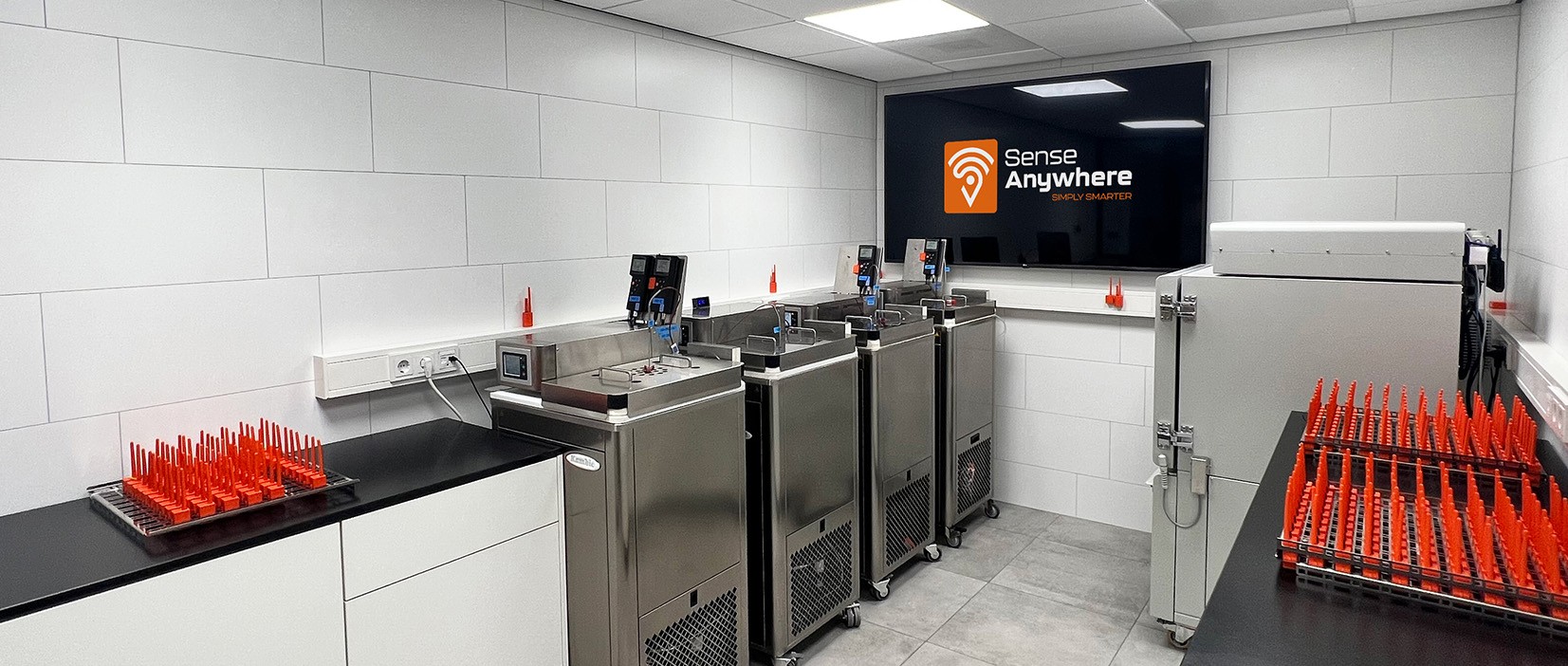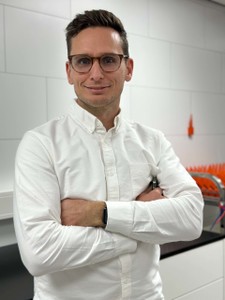Interview: SenseAnywhere’s Calibration Laboratory Receives ISO 17025 Accreditation
SenseAnywhere’s Calibration Laboratory is now ISO 17025 accredited. The ISO/IEC 17025 accreditation certificate shows that the company puts great value on quality and ensures that your calibration results are accurate and reliable.
By having its laboratory management system accredited to ISO/IEC 17025, SenseAnywhere’s Laboratory has gained international recognition for its commitment to quality, competency, and reliable results. In addition, the ISO/IEC 17025 accreditation signifies that it complies with an internationally recognized standard, thus easing the global exchange of valuable data and information.
SenseAnywhere’s clients can expect a number of significant benefits, such as being able to obtain a calibration certificate from the initial calibration retrospectively, with a positive impact on pricing and achieving much shorter lead times. Emile Coumans, SenseAnywhere’s Manager Calibrations & Compliance, talks about the significance of SenseAnywhere’s Calibration Laboratory ISO 17025 accreditation and how SenseAnywhere is helping its customers to overcome calibration and compliance challenges.
Q: Congratulations on your ISO/IEC 17025 accreditation! What does this new achievement mean for SenseAnywhere?
Thank you very much! The ISO/IEC 17025 accreditation means that the competence and quality of our calibration laboratory is officially recognized by the Dutch Accreditation Body (RvA). The RvA is a signatory to the European cooperation for Accreditation (EA) and to the International Accreditation Cooperation (ILAC) for the mutual recognition of calibration certificates.
Q: SenseAnywhere is already well known for providing ultra-accurate, long-lasting, reliable data loggers to its clients across the world. What further benefits can SenseAnywhere offer its customers with the addition of an ISO/IEC 17025 accredited laboratory under its roof?
Initial calibration is the final stage of our quality control process for our AiroSensors and Airo X Modules. The calibration process is performed in compliance with our accredited laboratory quality management system, which provides an acknowledged level of confidence. It also allows our customers to obtain an accredited calibration certificate from the initial calibration retrospectively.
Q: What is the best way to ensure the accuracy of measurement equipment?
The best way is to have it calibrated by an accredited calibration laboratory at appropriate measurement values and calibration intervals, depending on the applicable requirements. Periodic (intermediate) checks are recommended to prevent unexpected events or deviations. Data and trend analysis can also be helpful in controlling measurement equipment. When unexpected behaviour of the equipment is identified, external calibration by an ISO/IEC 17025 accredited laboratory provides unambiguous evidence of the equipment’s performance.
Q: Compliance checks, calibration, and validation – what are the differences and are all three required to ensure regulatory compliance?
Validation is a process for verification of compliance prior to implementation of a new method or procedure. Compliance checks are focused on process requirements during operation, whereas calibration is a method to test measurement equipment accuracy as (part of) a process requirement. For example: “GDP requires that environmental conditions of the distribution process must be thoroughly controlled. Equipment used for monitoring of environmental conditions should be calibrated at an appropriate interval and with proven competence”. As abstract as these phrases might seem, the established standard to fulfill this requirement is calibration of your equipment by an ISO/IEC 17025 accredited calibration laboratory. But prior to implementation of a distribution process, compliance to requirements must be validated, for instance by checking with a GDP auditor/consultant. Compliance checks are performed after the implementation of the process. In this example the Calibration certificates are evidence for compliance to the requirement of calibration at an appropriate interval and with proven competence.
Q: What is the definition of calibration in a laboratory?
Calibration in a laboratory is defined as a specifically designed and controlled process to verify the performance of measuring equipment, subject to specific requirements to the laboratory’s operations and competences. Measurement results must be traceable to the International Standards of Units (SI).
Q: Which are the types of calibration your laboratory is certified to perform?
Our scope of accreditation covers a temperature range from -90 °C up to 60 °C. For relative humidity (%rh) calibrations we can calibrate from 10 %rh to 90 %rh within an air temperature range of 23 °C to 30 °C.
Manager Calibrations & Compliance at SenseAnywhere
Q: Temperature and humidity are two variables that are often monitored in the pharma, biotech, diagnostics, healthcare, food as well as other industries. Why is calibration for temperature and humidity data loggers performed?
The use of measurement equipment entails the risk of damage and wear throughout the lifetime, which can influence measurement validity. Risks are managed by applying guard bands and decision rules. That is why calibration helps in mitigating risks, providing reliable measurement data for ensuring compliance to requirements and decision making.
Q: How important is ISO/IEC 172025 accredited lab calibration to ensure regulatory compliance, particularly in highly regulated industries such as the pharmaceutical sector?
To comply with regulatory requirements, organizations often have embedded accredited calibration as a must for their measuring equipment. Even when there is no specific regulation or requirement, it is best practice to have equipment calibrated by a partner who is officially declared competent by an external body. Traceability to the International Standard of Units (SI) is another well-known reason for choosing accredited calibration.
Q: What are some of the main challenges your clients are facing in terms of calibration and compliance?
Because of the “grey areas” in regulations and/or international standards, customers are struggling in their decisions regarding calibration requirements. Best practises not always are the most cost-efficient solutions, in terms of choosing appropriate calibration interval periods and calibration measurement ranges. We are always happy to discuss their requirements and needs. Another issue they are facing is how to keep monitoring during the absence of their measurement equipment. That is exactly why SenseAnywhere introduced the concept of AssetTagging: data continuity made easy by interchanging measurement devices without data loss.
Q: Does the ISO/IEC 17025 accreditation have an impact on lead times and pricing?
Customers who have their devices calibrated accredited by SenseAnywhere will experience a shorter lead time because shipping times are eliminated and our calibration process is highly efficient. Accredited calibration certificates generated retrospectively from our initial calibration will be available at an attractive rate. On top of that, we will be offering accredited calibrations performed within our scope of accreditation against the ‘NIST’ prices until the end of 2022.
Q: Making data-driven decisions requires quality, accurate data, particularly in industries like pharma where lives depend on it. How can companies ensure that their data loggers are calibrated properly?
ISO/IEC 17025 accreditation is globally one of the highest standards in the recognition of competence and quality for calibration laboratories. Therefor it will contribute to the assurance of data driven decision-making.
Q: Which future developments do you expect to see in the global supply chain monitoring sector, and how is SenseAnywhere going to help companies stay abreast of the complexity and challenges of tomorrow?
Data mining and Artificial Intelligence will be the main developments for the future of supply chain monitoring. More than ever, decision making will be data driven and highly automated information systems will become indispensable. SenseAnywhere is continuously developing new features to add to our validated Software, based on feedback from our customers who ultimately are the experts in deploying Monitoring Systems.
More about SenseAnywhere
Headquartered in the Netherlands, SenseAnywhere is a forward-thinking engineering and manufacturing company specialising in next-gen temperature monitoring solutions that are long-lasting, sustainable, easy to use, and fully compliant with pharmaceutical industry regulations.
Written by Pharma Industry Review
Download and share the full Interview: SenseAnywhere’s Calibration Laboratory Receives ISO 17025 Accreditation.
Subscribe to our newsletter
and stay updated on the latest developments



